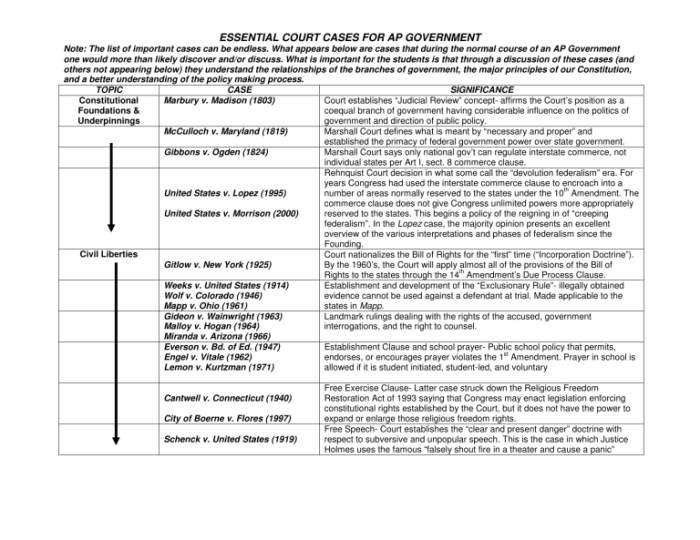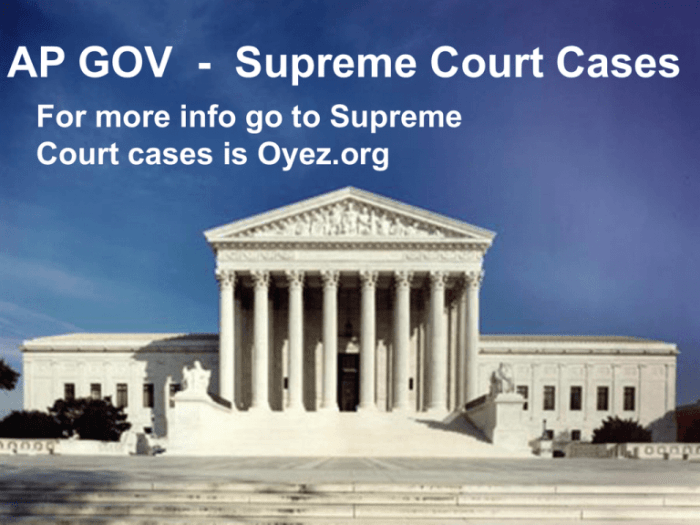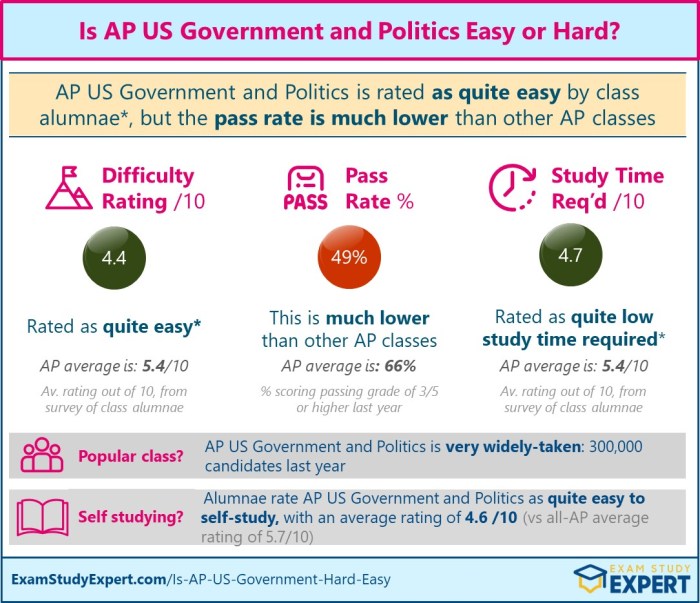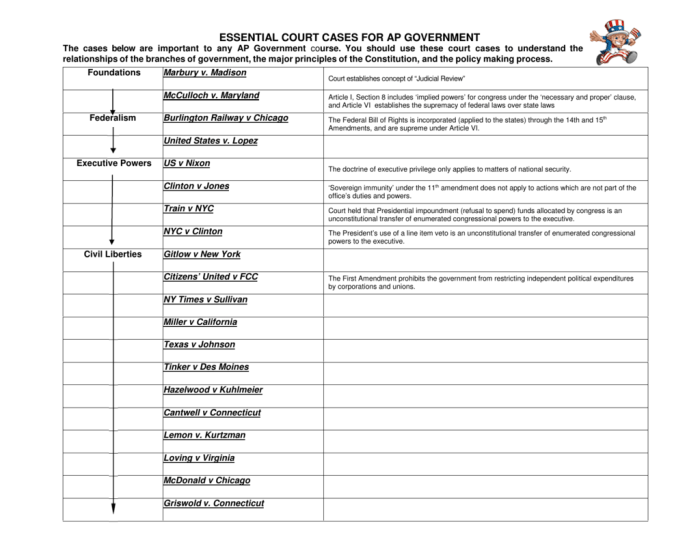AP Gov Required Court Cases 2023 explores a curated selection of pivotal Supreme Court and lower court cases that have profoundly shaped American jurisprudence. These cases have not only defined legal principles but have also had a profound impact on society, influencing everything from individual rights to the balance of power between government branches.
From the landmark ruling in Marbury v. Madison, which established the principle of judicial review, to the recent decision in Bostock v. Clayton County, which expanded LGBTQ+ rights under federal law, this comprehensive analysis provides a thorough understanding of the legal landscape and its evolution over time.
Supreme Court Cases: Ap Gov Required Court Cases 2023

The Supreme Court of the United States has played a crucial role in shaping the American legal and political system. Through its landmark decisions, the Court has established important principles and precedents that have had a profound impact on the nation’s development.
Marbury v. Madison
In 1803, the Supreme Court ruled in Marbury v. Madisonthat it had the power to declare laws unconstitutional. This decision established the principle of judicial review, which gives the Court the authority to interpret the Constitution and strike down laws that it deems to be in violation of it.
Marbury v. Madisonis widely regarded as one of the most important cases in American history, as it laid the foundation for the Court’s role as the ultimate arbiter of the Constitution.
McCulloch v. Maryland
In 1819, the Supreme Court ruled in McCulloch v. Marylandthat the federal government has the power to create a national bank. This decision established the principle of implied powers, which allows the federal government to exercise powers that are not explicitly granted to it in the Constitution.
McCulloch v. Marylandalso helped to establish the balance of power between the federal and state governments, as it limited the ability of states to interfere with the operations of the federal government.
Gibbons v. Ogden
In 1824, the Supreme Court ruled in Gibbons v. Ogdenthat the federal government has the power to regulate interstate commerce. This decision established the principle of the commerce clause, which gives the federal government broad authority to regulate economic activity that crosses state lines.
Gibbons v. Ogdenis widely regarded as one of the most important cases in American history, as it laid the foundation for the federal government’s role in regulating the economy.
Lower Court Cases

Lower court cases play a significant role in shaping the legal landscape of the United States. They interpret and apply the law to specific factual situations, providing guidance to individuals and organizations on their rights and responsibilities. Several landmark lower court cases have had a profound impact on American society, including Roe v.
Wade, Brown v. Board of Education, and Miranda v. Arizona.
Roe v. Wade (1973)
Roe v. Wade was a landmark Supreme Court case that legalized abortion in the United States. The case was brought by Jane Roe, a pseudonym for Norma McCorvey, who challenged the constitutionality of Texas’s abortion laws. The Supreme Court ruled in favor of Roe, holding that the right to privacy under the Fourteenth Amendment includes the right to terminate a pregnancy.
This decision has had a significant impact on reproductive rights in the United States, and it remains a controversial topic today.
Brown v. Board of Education (1954), Ap gov required court cases 2023
Brown v. Board of Education was a landmark Supreme Court case that desegregated public schools in the United States. The case was brought by thirteen Topeka, Kansas, families who challenged the constitutionality of the city’s segregated school system. The Supreme Court ruled in favor of the families, holding that racial segregation of public schools violated the Equal Protection Clause of the Fourteenth Amendment.
This decision was a major victory for the civil rights movement, and it helped to pave the way for the desegregation of other public facilities.
Miranda v. Arizona (1966)
Miranda v. Arizona was a landmark Supreme Court case that established the Miranda rights, which are the rights of individuals during police interrogations. The case was brought by Ernesto Miranda, who was convicted of kidnapping and rape. The Supreme Court ruled in favor of Miranda, holding that the police must inform suspects of their rights before questioning them.
These rights include the right to remain silent, the right to an attorney, and the right to stop answering questions at any time. The Miranda rights have had a significant impact on the way that police conduct interrogations, and they have helped to protect the rights of individuals.
Landmark Cases

Landmark cases are judicial decisions that have had a significant impact on the development of the law. They often establish new legal principles or overturn existing ones. Some of the most important landmark cases in American history include Plessy v.
Ferguson, Brown v. Board of Education, Gideon v. Wainwright, and Obergefell v. Hodges.
Plessy v. Ferguson (1896) and Brown v. Board of Education (1954)
Plessy v. Ferguson was a landmark Supreme Court case that upheld the constitutionality of racial segregation laws. The case arose from an incident in 1892 in which Homer Plessy, a light-skinned African American man, was arrested for sitting in a whites-only railroad car.
Plessy argued that the segregation law violated the Equal Protection Clause of the Fourteenth Amendment. However, the Supreme Court ruled that the law was constitutional, as long as the facilities provided for each race were equal.
Brown v. Board of Education was a landmark Supreme Court case that overturned Plessy v. Ferguson. The case arose from a challenge to the segregation of public schools in Topeka, Kansas. The Supreme Court ruled that the segregation of public schools was unconstitutional and violated the Equal Protection Clause of the Fourteenth Amendment.
Gideon v. Wainwright (1963)
Gideon v. Wainwright was a landmark Supreme Court case that established the right to counsel for indigent criminal defendants. The case arose from an incident in 1961 in which Clarence Earl Gideon, a poor man, was charged with breaking and entering.
Gideon was unable to afford an attorney, and the trial court refused to appoint one for him. Gideon represented himself at trial and was convicted. He appealed his conviction to the Supreme Court, arguing that he had been denied his right to counsel.
The Supreme Court ruled that the Sixth Amendment right to counsel applies to all criminal prosecutions, regardless of the defendant’s ability to pay. The Court held that the right to counsel is essential to ensure a fair trial and to protect the rights of the accused.
Obergefell v. Hodges (2015)
Obergefell v. Hodges was a landmark Supreme Court case that legalized same-sex marriage nationwide. The case arose from challenges to state laws that prohibited same-sex marriage. The Supreme Court ruled that the Fourteenth Amendment requires states to recognize same-sex marriages and to allow same-sex couples to marry.
The Obergefell decision was a major victory for the LGBTQ rights movement. It marked the culmination of decades of activism and litigation, and it has had a profound impact on the lives of LGBTQ people.
General Inquiries
What is the significance of Marbury v. Madison?
Marbury v. Madison established the principle of judicial review, empowering the Supreme Court to declare laws unconstitutional.
How did McCulloch v. Maryland impact the balance of power between the federal and state governments?
McCulloch v. Maryland affirmed the federal government’s implied powers and strengthened its authority over state governments.
What was the role of Roe v. Wade in shaping reproductive rights?
Roe v. Wade legalized abortion nationwide, establishing a woman’s right to choose.
